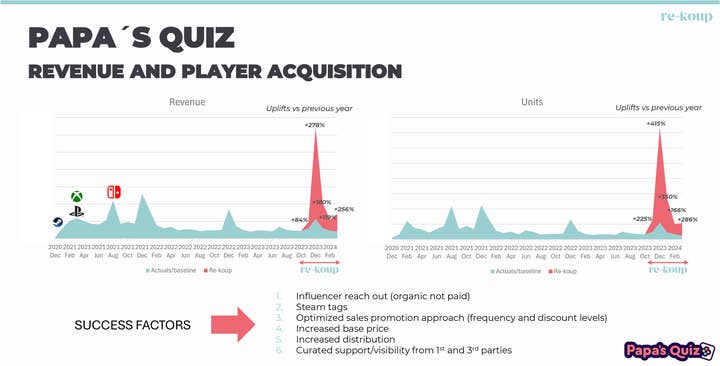Re-koup: "It’s time for publishing to change"
A Nordic publishing veteran is using a data-centric approach in a bid to re-invent video games publishing, and early results suggest he’s onto something
One need only take to their social media platform of choice to gauge the popularity of publishers among modern gamers. Some are bemoaned for crippling previously successful studios with the imposition of unwanted live service models, while others are lamented for implementing unpopular matchmaking algorithms that prioritise retention over connection quality or fair team composition. Certainly, while most big studios can boast of healthy fan support (look at the devotion enjoyed by From Software or Larian Studios, for instance), you don’t come across many vocal EA or Ubisoft fanboys.
Of course, in reality publishers play a vital role in promoting both the success and therefore financial health of the creative forces that make the video game industry what it is. However, it is fair to argue that, at a time when the AAA model that has ruled the roost for decades is under more threat than ever opportunities await for those who strive to evolve.
Sebastian Bastani is a AAA publishing veterans, having left a successful career in food to pursue his love of games, eventually heading up Activision Blizzard’s Nordic sales operations. Following a further fruitful three years at Funcom, for the last year he and the Re-koup team have been going it alone in pursuit of what Bastani describes as what “publishing as it should be”.
"The whole concept of Re-koup is to rethink the relationship between the publisher and the studio."
Lamenting the trappings that come with working for a large company, the Re-koup founder explains: “I love to execute things. I love to be where it happens. I want to be there at the forefront negotiating good game deals, or evaluating partnerships, or making decisions that promote positive change.” Escaping the transatlantic bureaucracy of international publishing means he is finally free to make educated, data-led decisions that, instead of being imposed by a remote parent, are born from both many years of experience and an understanding of the surprisingly simple techniques studios of any size can exploit to improve the success of their new and back catalogues.
Of course, the best part of a decade at one of the world’s largest publishers does come with its perks. Not only does it provide a contacts book which opens more doors than most, but it also means your bar for success is a high one. “Working on those kinds of titles, you always have to think big,” Bastani adds. “The targets are so high and the impact has to be enormous every time. Even though we now work with smaller budgets, we maintain that ‘think big’ approach.”

“Along with that passion for business is also a passion for change. The whole concept of Re-koup is to rethink the relationship between the publisher and studio. Look at the music industry, which has many synergies with games. The games industry is basically now on the same digital journey that changed music. How artists get their music out there and get paid has been a major discussion, but looking at games, we still essentially have traditional publishers doing the same thing they’ve always done. We need to change this; we need to do something totally different, something that puts the studio first. I mean, developers are our songwriters and performers. As an industry, we need to place the focus back on our creators.”
Re-koup was established with the ability to help studios at many points along the development process. The firm acts like an in-house publishing team, promoting both the IP and the studio.It is not only the IP that sell games it´s also the consumer perception of the studio’s brand and creditability
Its network of investment partners can help finance exciting concepts, while Bastani knows all there is to know about launching a game. But of course, it doesn’t end there – even if a game has shipped and its makers have long since moved onto to other things, a world of potential success remains for the taking if studios let the data guide their way.
"We know for a fact that lifecycle management can have a huge impact."
“When seeking investment, you can go to a VC and give up a lot of equity, partly losing some control of your company, or you can go to a publisher that probably wants to take your IP and have a controlling stake in the game design,” Bastani argues. “So no matter what, you either lose part of your company or you lose a lot of creative freedom. Our private investors are thinking about just one thing – is this a good investment? Can I double or triple my money if I invest? The art of making games is not something they’d pretend to know about.”
This is Re-koup’s fundraising and self-publishing service, where they green light a pitch and the rest is up to the studio, giving the team 100% creative freedom while having Re-koup in the background as their own in-house publishing team.
Another service the firm offers is around long-tail revenue for a game that has already been released. For this, Re-koup will only take a share of the additional sales it generates. When a partnership is struck, an agreement of a title’s anticipated base sales is made, created from a thorough analysis of sales patterns and market conditions. Re-koup then takes its share of any additional revenue beyond this baseline. If for whatever reason it fails to increase sales as forecast, then Re-koup gets no money at all. The deal is essentially risk free for studios, who are only surrendering a small slice of sales that would otherwise not exist.

“Our long-tail revenue model makes sure nothing is ‘stolen’ from the studio – it’s important to us that the studio feels comfortable that we are not tapping into revenue they would have still got without our help,” Bastani elaborates. “By looking at historical data, it is quite easy to establish a natural yearly sales decay. Things become a bit more tricky if a studio plans to launch their first DLC during our partnership, as the potential sales uplift needs to be accurately predicted. We have, however, done this for many titles in the past and have a very good sense of what to expect. In the end, the studio has to agree with our sales estimations in order for us to enter a partnership.”
Re-koup’s modelling is flexible enough to account for both games that continue to be supported post-launch, as well as those that are not and even back catalogue releases. Adds Bastani: “One of the great things with this service is that ongoing title support from the studio is absolutely not required. We are able to maximize sales and revenue intake of their game even if the studio has already moved onto a new project.”
It looks good on paper, but digging down into some of Re-koup’s early numbers is equally as impressive.
Papa’s Quiz from Swedish studio Old Apes launched on Steam back in December 2020 and then on consoles throughout 2021. Re-koup came on board in late 2023 and immediately the game enjoyed its best ever month in terms of revenue. And by far, too, with numbers jumping 278 per cent year-on-year In the same period, units were up 415 per cent year-on-year. Bastani adds somewhat humbly that some of this was down to luck thanks to the game being picked up by a popular influencer, but of course it was Re-koup itself that initiated the influencer outreach program.

“Over the years we've met a lot of influencers, content creators and streamers and we've been smart about collecting their information,” he explains. “The first thing that we always do when we start working with a new studio and their game.
There’s more to it than that, of course.. Bastani emphasises that discoverability is, in his opinion, the single biggest challenge facing any new release, and much of the publisher’s work focuses on improving this.
In the case of Papa’s Quiz, Re-koup immediately addressed the game’s Steam tags to help get the right eyeballs on its Steam page, and adjusted the frequency of sales promotions, along with the amount of discount applied. As a result, the game’s impressions soon jumped from 86,000 per month to 235,000. The language on the Steam page was adjusted, too, to be more descriptive of the game experience and to appeal to fans of the appropriate genre.
Re-koup then increased the game’s base price from $9.99, which it felt was too low, to $12.99 without suffering any unit sale losses. It also tapped up its network of first and third party partners to garner the game additional exposure on digital storefronts.
“We got a lot of curated support from first and third parties by leveraging all of their different marketing and sales vehicles in a strategic and coordinated way,” Bastani says. “And the end result was that the studio was very happy. We've been working with them for five months now and the results have been really, really good.”
"The deal is essentially risk free for studios, who are only surrendering a small slice of sales that would otherwise not exist"
Inspector Schmidt: A Bavarian Tale, from German developer Active Fungus Studios, is another success story. Despite a fairly positive critical reception, sales of the title quickly fell off a cliff shortly after its launch in February 2023.
“The first thing that we did was to change the name of the game from the very German-facing A Bavarian Tale – Totgeschwiegen to ‘Inspector Schmidt: A Bavarian Tale’,” Bastani says. “We sent out influencer codes, although this time we also ran a small paid campaign costing $3k. Along with securing some renewed support from third-parties, we regained a lot of the game’s previous visibility.”
Unit sales jumped 663% year-on-year jump in March, while revenue increased 66% in February and 114% in March. Perhaps it’s no surprise then that, while Re-koup has clients with games that are still in early development or approaching release, this demonstrable success in managing the notoriously tricky long-tail is leading to a lot of demand.
“In games we talk a lot about pre-launch and a lot about launch, obsessing over Wishlists and the like. But we very seldom hear discussions about what happens afterwards,” Bastani observes. “For some reason, we only focus on the first two thirds of a game’s lifecycle. Having worked in the industry for 10 or 15 years now and across some 150 or so games, we know for a fact that lifecycle management can have a huge impact.
“Re-koup’s average revenue uplift across all its clients currently stands at 40 per cent. From a technical perspective there’s a ton you can do – maxing out the number of campaigns, being dynamic in the way you set discounts and ensuring you enter the right promotions with the right discounts. Make sure that you utilise partners, properly look at your Steam data and learn how to work with the algorithm a bit. Think about where your visitors are coming from. Identify where the problems are. Is it click-through? Is it conversion. The methodology works and every time we manage to increase sales.”
Discover how Re-koup can support your studio - Click here to learn more
